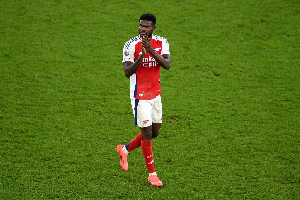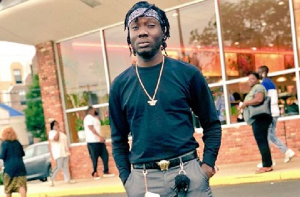Accra, June 1, GNA - Dr Kwadwo Afari-Gyan, Chairman of the Electoral Commission (EC) on Tuesday said reports from the photo-taking exercise undertaken in seven Regions indicated that the coverage level was between 89 per cent 95 per cent on the average.
He said, currently the exercise was ongoing in the Western Region, after which it would move to the Central and Greater-Accra Regions, adding that after the exercise there would be a mopping up exercise to enable registered voters, who could not have their photos taken to do so.
"We reckon that about one million applicants will fall into the mop up category," he said. "The Commission is hopeful that when the time comes the political parties would support us to ensure that no registered voter was disenfranchised."
Dr Afari-Gyan was presenting a paper on: "The EC and Preparation for a Violence-Free Election 2004", at a day's consultative seminar organized by the Council of State with technical support from the Centre for Democratic Development (CDC - Ghana).
The seminar, jointly sponsored by the UNDP and the National Governance Programme (NGP), was under the theme: "Towards Peaceful, Free and Fair Election 2004; Consultations with Political Parties and other Stakeholders" and was attended by Members of the Council of State, representatives of political parties, media and civil society organizations.
It was to provide an impartial forum for political parties and other key stakeholders in the democratic process to deliberate on the imperatives of political tolerance, peace, freedom and fairness in the forth-coming elections and to explore ways of reducing election conflict and foster peaceful, credible, free and fair elections.
Dr Afari-Gyan told the participants that the EC had done and would continue to do its work with due diligence to ensure that the photo-taking exercise was conducted with all fairness, transparency and integrity, adding that "we would ensure to attach the same level of transparency, fairness and integrity to the remaining activities relating to election 2004, particularly in the conduct of the poll, the counting of votes and the declaration of results".
The assurance came in the wake of complaints by the leading opposition party, the National Democratic Congress (NDC) of poor coverage of the photo- taking exercise in its stronghold, the Volta Region, where the EC had reported that the coverage was at least 89 per cent.
Dr Afari-Gyan noted that during the voters registration exercise the only problem encountered by the EC was shortage of registration forms in the Greater-Accra Region, where the number of registered voters had increased from a little over 1.9 million to 2.1 million, representing 69 per cent of the total population of the region, which stood at 3.1 million.
He said 10,766,531 were registered countrywide, being 53 per cent of the total national population of 20.5 million in 2003, adding that, that excluded Ghanaians living abroad, whose names, he said, were being compiled.
Dr Afari-Gyan pointed out that since the electoral process began, nobody had accused the EC of gerrymandering or of any deliberate attempt to stifle the efforts of any political party in favour of the other, adding that the political parties should, therefore, educate their members about the credibility of the EC and its efforts to ensure a free and fair elections.
He said peaceful elections largely depended upon the proper electoral behaviour of the ordinary person, who was usually made to believe that someone was manipulating the process to favour a particular party.
"Under the umbrella of voter education, the EC would assist political parties to train their polling agents, but we expect that political parties themselves, civil society organizations, religious bodies and the National Commission on Civic Education (NCCE) to assist in the voter education process," he said.
He said at the Inter-Party Advisory Committee (IPAC) level, the EC had observed that decision taken at the national level did not seep down to the regions and districts, where most of the violence and conflicts erupted during elections.
"So the Commission has decided to formally extend the periodic IPAC meetings to the regions and districts. Hopefully the Regional Inter-Party Advisory Committees (RIPAC) and the District Inter-Party Advisory Committees (DIPAC) will serve, among other things, as conflict prevention and resolution mechanisms," he said.
Professor Alex Kwapong, Chairman of the Council of State, who presided noted that much as peaceful, fair and violent-free elections was vital to the democratic process of the country, it demanded hard work from all Ghanaians to make it a reality.
"The Council of State believes that peaceful, fair and violent-free elections are not handed over to a people on a silver platter - citizens, organizations, both public and private, all have to work hard to achieve that result," he said.
He expressed the hope that the seminar would make an important contribution to the consolidation of the present democratic dispensation of the country.
Mr Larry Bimi, Chairman of the National Commission for Civic Education (NCCE), speaking on: "Educating Voters on Conflict-Free Elections", complained that the civic education efforts of the Commission had been greatly constrained by inadequate Government budgetary allocation, saying that recently the Commission was allocated a paltry 500 million cedis to undertake civic education.
He said foreign donors, who had aided the Commission in the past, were also not as forthcoming in recent times, adding, "its either we are serious about democracy or we are not because inadequate budgetary allocation to the NCCE was not indicative of Government's commitment to democracy".
Other topics discussed at the seminar included: "The Media and Violence-Free Elections"; "Maintaining Security During Elections" and "The Need for Tolerance in Peaceful Elections."
Participants attending said the over-dependence on foreign aid for the conduct of elections should be stopped and that State funds should rather be used to ward off any possible foreign influences.
General News of Tuesday, 1 June 2004
Source: GNA
















